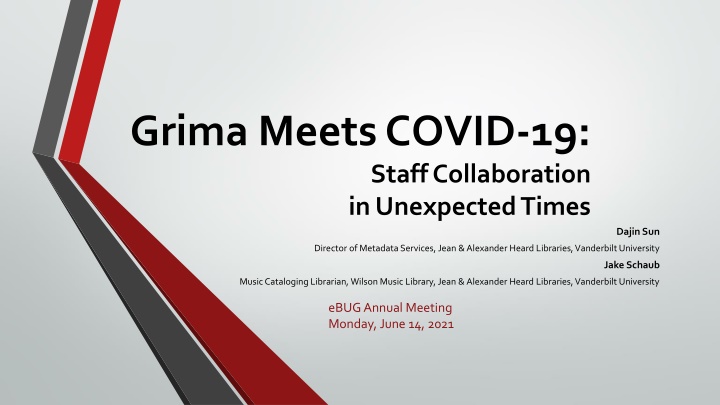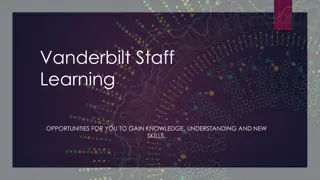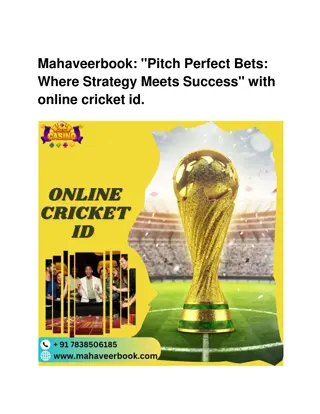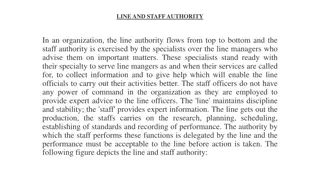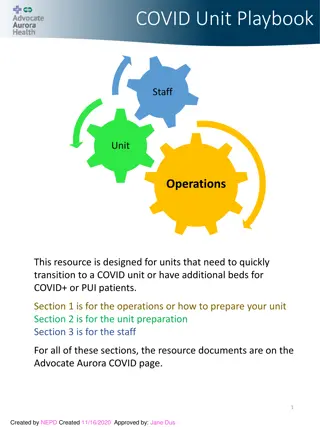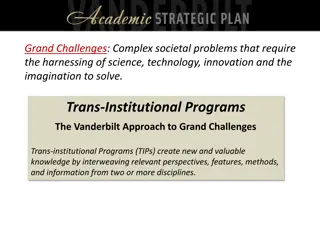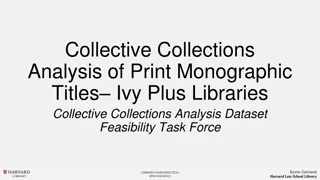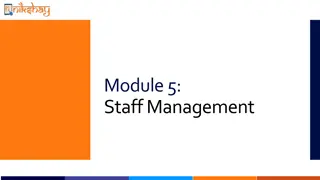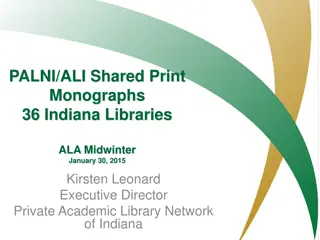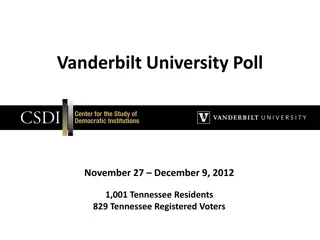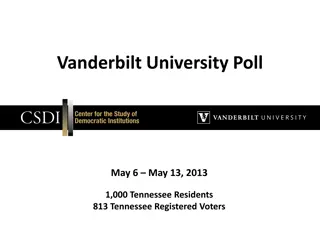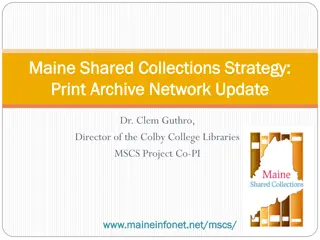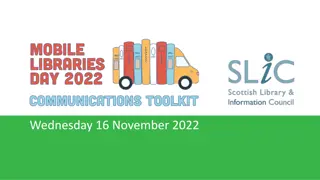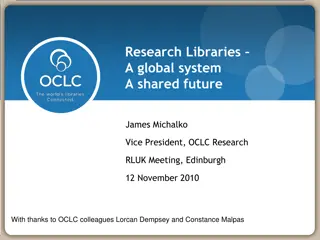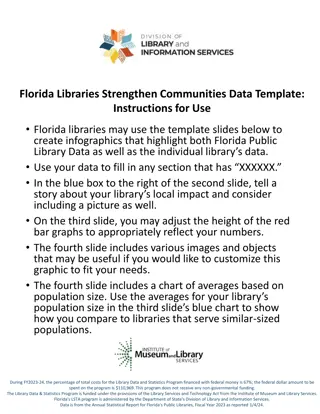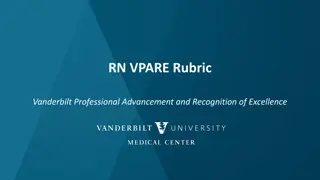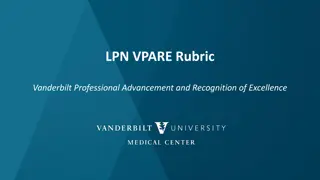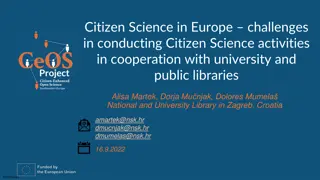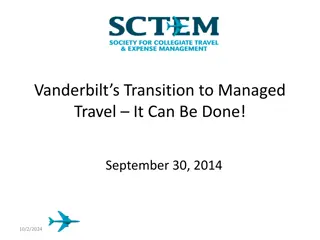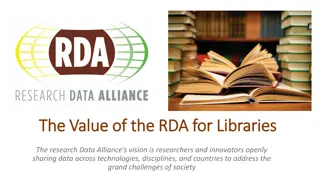Grima Meets COVID-19: Vanderbilt Libraries' Staff Collaboration Project
The Grima Meets COVID-19 project at Vanderbilt University's libraries involved staff collaboration to address data quality issues arising from a migration to Alma during the pandemic. With a focus on fixing item call number problems, over one million records were targeted library-wide. Staffing involved frontline workers, catalogers, and problem-solving efforts. Resultant issues included confusing data structures, misplaced volume-level data, and complaints about merged holdings records. The project aimed to enhance user discovery and access to library resources.
Download Presentation

Please find below an Image/Link to download the presentation.
The content on the website is provided AS IS for your information and personal use only. It may not be sold, licensed, or shared on other websites without obtaining consent from the author.If you encounter any issues during the download, it is possible that the publisher has removed the file from their server.
You are allowed to download the files provided on this website for personal or commercial use, subject to the condition that they are used lawfully. All files are the property of their respective owners.
The content on the website is provided AS IS for your information and personal use only. It may not be sold, licensed, or shared on other websites without obtaining consent from the author.
E N D
Presentation Transcript
Grima Meets COVID-19: Staff Collaboration in Unexpected Times Dajin Sun Director of Metadata Services, Jean & Alexander Heard Libraries, Vanderbilt University Jake Schaub Music Cataloging Librarian, Wilson Music Library, Jean & Alexander Heard Libraries, Vanderbilt University eBUG Annual Meeting Monday, June 14, 2021
Project Overview The Enumeration Project was launched library-wide in April 2020 to leverage the availability of a new library-wide workforce during the COVID- 19 shutdown Goal: Fix item call number problems in Alma that prevent users from finding individual issues of journals and/or monographic sets in Primo Over one million records were targeted
Project Overview Project Staffing Project Workflow ca. 21 staff from across the system Frontline work with Grima 5 additional catalogers Problem-solving by catalogers More staff joined later
Background: The Problem Vanderbilt Libraries migrated to Alma from Sirsi on July 23, 2018 Sirsi and Alma are structured differently When encountering unclear or bad data, the Ex Libris migration algorithm often autogenerated new holdings records Crosswalking data between the two was affected by data quality and software structure
Background: The Problem Resultant problems: Requisite volume-level data was not in the correct place in a given record, so: The public had difficulty identifying what we hold and how to request it if from off-site Alma would consider a 12-volume set as 12 copies of the same volume Pilfered call numbers from individual volumes (e.g., DA176 .S72 v.6) sometimes applied to all volumes within a set Items often attached to the wrong holdings records EMPTY libraries or UNASSIGNED locations if data was ambiguous at migration
Background: The Problem Resultant problems: Franken-records : multiple holdings records merged into a confusing mess Labels would not print correctly if there was a volume number Lots of complaints
What Needs to be Done? Discovery #1: Data being present in the Item Call Number field was one strong indicator that something had gone awry in migration (ca. 1.1 million items) Discovery #2: Populating the Item Description field with volume-level information would clarify which volume was which for both the system and the public
Solution #1 (2019) Solution: Transferring portions of one field to another in the item record. Trained staff from various divisional libraries to address this issue on a case- by-case basis as complaints arose
TheGrima (partial automated solution) API tool inspired by other tools used at the University of Kentucky called Grima This one developed at Vanderbilt in coordination between Jake Schaub and Dale Poulter (LTDS) Takes a bib record MMS ID as input Compares an Item Call Number data with data in its associated holdings record Applies an algorithm to transfer item-level data from one field to another for every item attached to a bib record Operates according to very strict criteria to prevent collateral damage
Why not a fully automated solution? Too many unusual situations that require human eyes to untangle first By a rough estimate, only ca. 50% of eligible records might be able to be Grima ed without further changes. Examples of problems the Grima cannot solve on its own.
User roles in Alma are restricted for many staff, so they can only apply limited changes to records (usually restricted to item-level changes) 2019 Mar. Tier 1 training (pre- Grima) Trained ca. 30 staff to do simple hand transfer of enumerations data on an as-needed basis, and when to hand problems up to cataloging Who could work on this and when?
COVID lockdown Mar. 2020 Quickly developed a general plan and training materials Trained ca. 21 staff (mostly circulation and technical services staff) to work with the new Grima From Annex, Central, Biomedical, Peabody (Education), Science/Engineering, and Management libraries, and from Preservation and Technical Services 5 main catalogers oversaw final cleanup From Music, Divinity, and Biomedical libraries, and the Central Technical Services Cataloging unit Enter COVID-19
Workflow Alma Reports created for eligible records at various libraries and locations (updated daily) Managers distribute Excel lists of items to individual staff Staff examine record and run the Grima. If the Grima resolves all enumeration problems, life is good. If the Grima does not work on a record and/or any red flags are encountered, staff enter MMS ID with a short explanation in a separate Google spreadsheet organized by divisional library Red flags: Holdings records with items attached Presence of an enumeration in a holdings root call number Anything else that looks strange Enter COVID-19 Cataloging staff investigate each problem record and resolve any lingering issues
Successes Between Mar. 2020 and early 2021: 800,000+ item records corrected User access improved No staff were furloughed
Challenges Training staff who had no background in anything like this, and may not know when to pass on records to a cataloger. The Grima cannot handle SuDoc records due to the differences in spacing Keeping track of workflow and the uniform entering of information in the various spreadsheets Avoiding duplication of efforts/infringing on turf Problem solving when there was no physical access to the collection
Moving forward A handful of problematic records need examination of the physical item Law Library and Special Collections were not involved originally but are joining the project right now
Questions? dajin.sun@vanderbilt.edu jake.schaub@vanderbilt.edu
